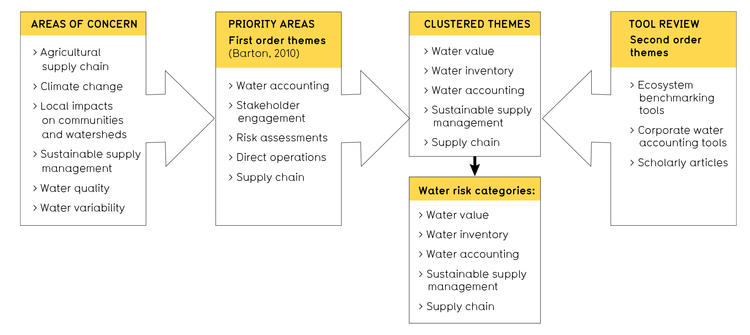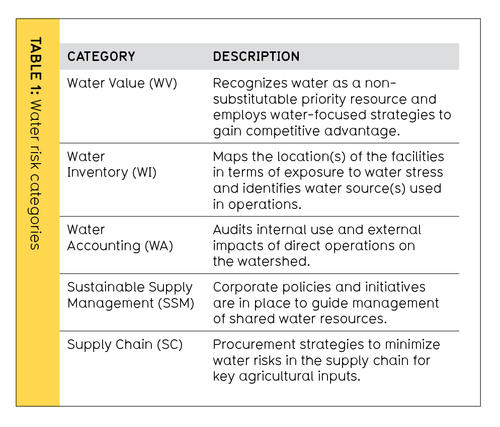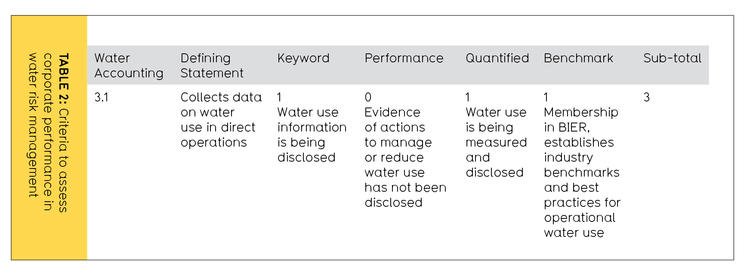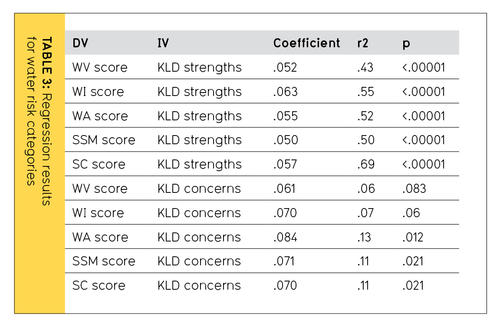Water is a major input in the production of food and beverage products. Risks to water supply can, therefore, have a significant effect on production, including to its costs. Water risks could include changes in water and wastewater treatment costs, process and supply chain disruptions, or delayed or suppressed growth due to competition for water. In addition, increased demands for food over upcoming decades will impact risks to water security in countries or regions that are water scarce. Effective and efficient water management in the food and beverage industry is therefore critical.
In this study we analyze the connection between indicators that address sustainable water management and the general corporate social performance (CSP) of firms. We explore which water ecosystem indicators are used in the food and beverage industry to assess corporate water risk management, and we examine the relationship between corporate water risk management and overall CSP.

Figure 1: Indicator development
Methodology
We developed an indicator system that applied a scoring-benchmarking structure to appraise various corporate water risk management performance disclosure documents (Figure 1). Appropriate indicators to assess i) the long-term strategic management of watersheds and ii) water-based business risks to the food and beverage sector were identified. Risk-based areas of concern were then identified and merged with components of corporate water risk management to identify priority areas to assess a firm’s exposure to water risks (Table 1).

Table 1: Water risk categories
The benchmarking structure was further developed by adding descriptive definitions for risk categories to answer the questions “what needs to be measured/managed” and “why is this a concern” and “what is being measured/managed” and “why is this being measured/managed”. An iterative cycling process, using water indicators, risk themes, and statements, resulted in a coherent set of indicator statements. Eighty-four indicators were then used to measure the water management strategy and performance of 61 food and beverage firms, including brewers, distillers and vintners, soft drinks, agricultural products, packaged foods and meats sub-groups, using data from 2013 and 2014 corporate disclosures. Performance was assessed across four hierarchical criteria – keyword, performance, quantitative measures, benchmarks – using a three point scale, with a score of 1 assigned when an action had been taken, 0 when there was no evidence that action had been taken, and −1 when a penalty was pending or levied (see an example in Table 2).

Table 2: Criteria to assess corporate performance in water risk management
Descriptive statistics were applied to assess differences in the disclosure of indicators. Factor analysis was used to analyze the contribution of the indicators to the categories, and to calculate the final score for each category. Analysis of variance was performed to gauge differences between subindustries in the sector, while linear regression analysis was used to calculate firms’ water scores and environmental, social and governance (ESG) ratings according to the MSCI-KLD. This index consists of 54 indicators to assess a firm’s ESG strengths, and 45 indicators to assess a firm’s ESG concerns.
Outcomes
We found that firms from the food and beverage sector usually follow a strategic corporate social responsibility (CSR) approach to manage water risks; that is, firms address water risks and opportunities that are important for their businesses to achieve competitive advantage. The results also show that water and ecosystem approaches were addressed on average by 29 to 42 per cent of the sampled firms, indicating the importance of water-related disclosures that might be driven by the industry’s water sensitivity.
The results of the regression analyses suggest that the water score of the firms in the sample can be predicted by CSR “strength” indicators, but not by CSR “concerns” indicators. Accordingly, firms with higher CSP ratings assessed through strength indicators also had higher ratings for water management performance, indicating that water management was an integral part of their CSR strategy because of its link to profit and competiveness. It was also found, however, that firms with a high number of CSR concerns might have high or low water management performance. The relationship between water management performance and concerns was not direct because high performance might have been in reaction to concerns, whereas poor performance might be the cause for concerns.
The correlation between water management performance and general CSR performance supports the so-called good management theory which claims that corporate sustainability has an impact on financial performance because it helps a firm to reduce costs, increase its reputation, and address stakeholders that are interested in the fi rm’s social and environmental responsibility. CSR leaders address issues that are material for their businesses. As food and beverage is one of the most water intensive industries, water management can have a significant impact on a firm’s business performance.
Finally, the connection between the different water management categories and CSP is able to predict a firm’s performance with regard to water values, water indicators, water accounting, supply management and supply chain. The result suggests that CSR leaders in the food and beverage sector are also leaders in addressing water risks and opportunities connected with their business activities (Table 3).

Table 3: Regression results for water risk categories
Conclusions
This study suggests that general corporate environmental, social, and governance performance is able to predict water-related performance in the food and beverage sector. We found that the firms’ general corporate social performance, measured by MSCI KLD-ESG indicators, is a good predictor for the firm’s use of water indicators. We conclude that the firms in the sample follow a reactive approach for their water management activities, and that water management is a significant component of corporate social responsibility activities because the business performance of food and beverage firms depends on the sustainability of water as a production input.
Weber, O., Hogberg-Saunders, G. (2018). Water management and corporate social performance in the food and beverage industry. Journal of Cleaner Production, 195, 963-977. DOI.org/10.1016/j.jclepro.2018.05.269
Contact: Olaf Weber, School of Environment, Enterprise and Development
For more information about WaterResearch, contact Julie Grant.







